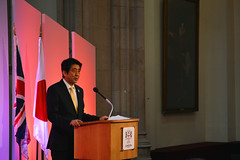ASIA
21 May 2014
OECD Week 2014, 5-7 May
Over the coming days, we will be reporting on OECD Week 2014. The highlight will be a keynote speech by Japanese Prime Minister Shinzo Abe, on Tuesday 6 May, at OECD Forum 2014.
Over the coming days, we will be reporting on OECD Week 2014. The highlight will be a keynote speech by Japanese Prime Minister Shinzo Abe, on Tuesday 6 May, at OECD Forum 2014.
What are the main events? What are the issues?
The Ministerial Council Meeting, on 6-7 May, will address the lofty theme of "The Resilient Economies and Inclusive Societies: Empowering people for jobs and growth".
Nearly six years after the start of the worst economic crisis of our lifetimes, some of the main engines of global growth (trade, investment, credit, employment) are not yet where they should be.
Tackling social challenges, particularly by generating more and better quality jobs and ensuring the effective provision of public services, remains at the forefront of policymakers’ concerns.
At the same time, long-term trends, such as ageing populations and climate change, impose significant policy constraints and challenges.
These economic and social challenges underscore the need to protect and empower people by strengthening ‘human security’.
Debates on these critical issues will take place under the Chairmanship of Japan, with the United Kingdom and Slovenia as Vice-Chairs.
OECD Forum 2014 (5-6 May 2014) is organised around three cross-cutting themes: Inclusive Growth, Quality Jobs, and Trust, exploring the multifaceted nature of resilience and how to now “bounce forward” in addressing economic, social, and environmental challenges.
Inequality is growing and the distribution of burdens and rewards across society is becoming more uneven. This raises concerns about undue influence over public policy, and leads many to question the ability of our governments and institutions to find equitable, lasting solutions to the crisis.
Tackling social challenges requires generating more and better quality jobs and ensuring the effective provision of public services. But the main engines of economic growth (including trade, investment and credit) have not yet recovered their pre-crisis dynamism.
At the same time, long-term trends, such as ageing populations and climate change, impose significant policy constraints and challenges.
To achieve sustainable, balanced and inclusive growth in these conditions, people need to be both empowered and protected.
The resilience of our economies, societies and institutions has to be strengthened.
Follow our reports on these discussions, which tackle the key challenges of our time.
Executive Director
Asian Century Institute
www.asiancenturyinstitute.com
What are the main events? What are the issues?
The Ministerial Council Meeting, on 6-7 May, will address the lofty theme of "The Resilient Economies and Inclusive Societies: Empowering people for jobs and growth".
Nearly six years after the start of the worst economic crisis of our lifetimes, some of the main engines of global growth (trade, investment, credit, employment) are not yet where they should be.
Tackling social challenges, particularly by generating more and better quality jobs and ensuring the effective provision of public services, remains at the forefront of policymakers’ concerns.
At the same time, long-term trends, such as ageing populations and climate change, impose significant policy constraints and challenges.
These economic and social challenges underscore the need to protect and empower people by strengthening ‘human security’.
Debates on these critical issues will take place under the Chairmanship of Japan, with the United Kingdom and Slovenia as Vice-Chairs.
OECD Forum 2014 (5-6 May 2014) is organised around three cross-cutting themes: Inclusive Growth, Quality Jobs, and Trust, exploring the multifaceted nature of resilience and how to now “bounce forward” in addressing economic, social, and environmental challenges.
Inequality is growing and the distribution of burdens and rewards across society is becoming more uneven. This raises concerns about undue influence over public policy, and leads many to question the ability of our governments and institutions to find equitable, lasting solutions to the crisis.
Tackling social challenges requires generating more and better quality jobs and ensuring the effective provision of public services. But the main engines of economic growth (including trade, investment and credit) have not yet recovered their pre-crisis dynamism.
At the same time, long-term trends, such as ageing populations and climate change, impose significant policy constraints and challenges.
To achieve sustainable, balanced and inclusive growth in these conditions, people need to be both empowered and protected.
The resilience of our economies, societies and institutions has to be strengthened.
Follow our reports on these discussions, which tackle the key challenges of our time.
Author
John WestExecutive Director
Asian Century Institute
www.asiancenturyinstitute.com




